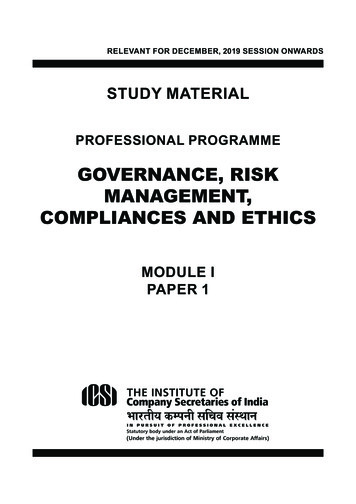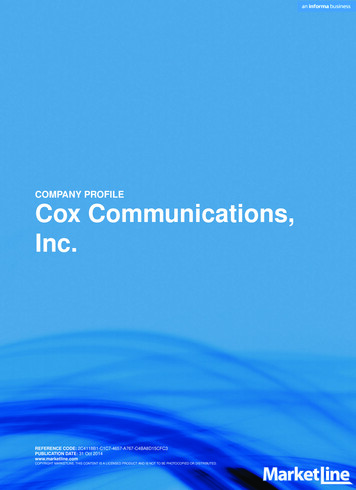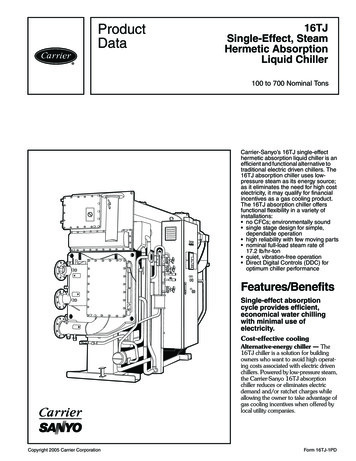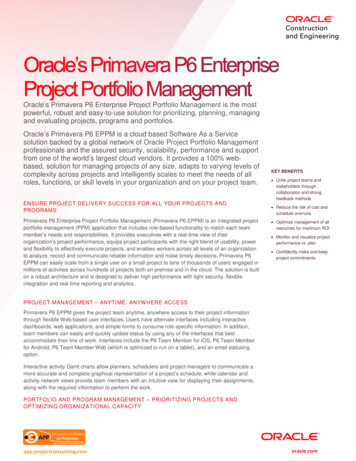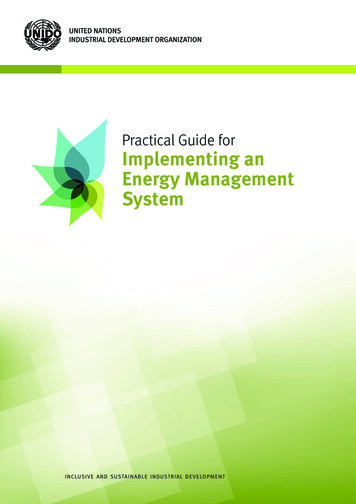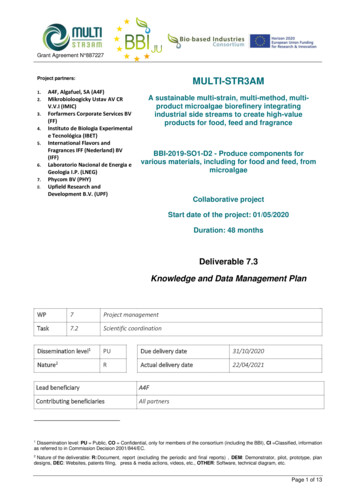
Transcription
Grant Agreement N 887227Project partners:1.2.3.4.5.6.7.8.MULTI-STR3AMA4F, Algafuel, SA (A4F)Mikrobioloogicky Ustav AV CRV.V.I (IMIC)Forfarmers Corporate Services BV(FF)Instituto de Biologia Experimentale Tecnológica (IBET)International Flavors andFragrances IFF (Nederland) BV(IFF)Laboratorio Nacional de Energia eGeologia I.P. (LNEG)Phycom BV (PHY)Upfield Research andDevelopment B.V. (UPF)A sustainable multi-strain, multi-method, multiproduct microalgae biorefinery integratingindustrial side streams to create high-valueproducts for food, feed and fragranceBBI-2019-SO1-D2 - Produce components forvarious materials, including for food and feed, frommicroalgaeCollaborative projectStart date of the project: 01/05/2020Duration: 48 monthsDeliverable 7.3Knowledge and Data Management PlanWP7Project managementTask7.2Scientific coordinationDissemination level1PUDue delivery date31/10/2020Nature2RActual delivery date22/04/2021Lead beneficiaryA4FContributing beneficiariesAll partners1Dissemination level: PU Public, CO Confidential, only for members of the consortium (including the BBI), CI Classified, informationas referred to in Commission Decision 2001/844/EC.2Nature of the deliverable: R: Document, report (excluding the periodic and final reports) , DEM: Demonstrator, pilot, prototype, plandesigns, DEC: Websites, patents filing, press & media actions, videos, etc., OTHER: Software, technical diagram, etc.Page 1 of 13
MULTI-STR3AM – D7.3, Knowledge and data management planWP 7:3A4FAuthorA4FApproval by WP leaderA4FApproval by coordinatorDocument tionV330/03/2021A4FFinal version for evaluationV422/04/2021A4FFinal versionCreation, modification, final version for evaluation, revised version following evaluation, finalPage 2 of 13
MULTI-STR3AM – D7.3, Knowledge and data management planDeliverable abstractThis report is a deliverable associated with Task 7.2 “Scientific coordination” and describes theapproach taken to knowledge management by the MULTI-STR3AM consortium and provides a DataManagement Plan (DMP) to be followed throughout the project.This first DMP (Deliverable 7.3) follows the structure of the Horizon 2020 DMP template and hasbeen developed according to Horizon 2020 open data requirements and implementation guidelinesas well as FAIR data management principles. It includes details on what data will be collected,processed and/or generated by MULTI-STR3AM, how collected and generated data will be handledduring and after the project, whether data will be shared/made open access and lastly how data willbe preserved so that it remains accessible and usable following the completion of the project.This publicly available document represents an initial version of MULTI-STR3AM’s DMP. Futureiterations will include the results of data collection and generation activities performed during theproject and outline the procedures for management of these.Page 3 of 13
MULTI-STR3AM – D7.3, Knowledge and data management planTable of ContentsTable of Contents . 4123Introduction . 51.1Purpose of this document .51.2Intended audience .51.3Links to other tasks and WPs within MULTI-STR3AM .5Knowledge and data management in MULTI-STR3AM . 52.1Background and overall knowledge management strategy .52.2Role of the Data Management Officer .6Data Management Plan . 63.1Data summary .63.1.1Data related to WP1: Market analysis, exploitation and impact .73.1.2Data related to WP2: Strain validation and biomass production .83.1.3Data related to WP3: Biomass refining .83.1.4Data related to WP4: Product demonstration and validation .93.1.5Data related to WP5: Social, environmental and economic impact assessment .93.1.6Data related to WP6: Communication and dissemination . 103.1.7Data related to WP7: Project management . 103.2FAIR data . 103.2.1Open data produced by MULTI-STR3AM . 103.2.2Non-open data produced by MULTI-STR3AM . 113.3Allocation of resources . 113.4Data security . 113.5Ethical aspects . 12Page 4 of 13
MULTI-STR3AM – D7.3, Knowledge and data management plan1 Introduction1.1 Purpose of this documentThis public document presents the first DMP for the MULTI-STR3AM project. It describes the overallData Governance in the project including the lifecycle of data to be collected, generated, used orprocessed within the project and the handling of data, including methodologies, data sharing, privacyand security considerations, legal and regulatory requirements, informed consent, open access, forduring and after the project. The goal of considering these aspects of data management is to ensuredata is well managed during the project, ensuring its effective implementation, and properly preservedfor future use, ensuring the full potential and value of the data is retained.This document describes the current status of the DMP at the time of delivery, October 2020, and willbe refined by future deliverables of the DMP and updates in individual Work Packages (WPs).1.2 Intended audienceThe intended audience of this document is both the participants in the MULTI-STR3AM and thirdparties wishing to learn more about data management practices within this project.1.3 Links to other tasks and WPs within MULTI-STR3AMTask 7.2 on scientific coordination, with which this deliverable is associated, forms part of WP7 onoverall project management, but is closely linked with all other WPs of MULTI-STR3AM as each WPentail the collection, generation and handling of data of either private, corporate or scientific nature.In WP1, data will be generated related to market research (T1.1) and in the form of transcripts of policymeetings (T1.4) and stakeholder databases (T1.2). Additionally, T1.3 is closely linked to T7.2 since itidentifies commercially and non-commercially exploitable results and consider their direct and indirectvalue for different stakeholders. For WP2, chemical, biological and genetic data will be collected intostrain dossiers (T2.4) and operational data and documentation will be produced for production andtransport manuals (T2.6). WP3 will generate data relating to process optimisation (T3.4),compositional analyses (T3.5) and design specifications for the MULTI-biorefinery (T3.1). WP4 willgenerate documentation in the form of specification sheets for the microalgae products (T4.1) as wellas scientific performance data of the different microalgae ingredients (T4.3-T4.5). WP5 will collate andprocess data from all other WPs on the social, environmental and economic impacts of MULTI-STR3AM(T5.1) and will use these data to perform a TEA (T5.3) and LCAs (T5.4). In WP6 names and emailaddresses will be collected as a part of a newsletter signup (T6.2) and finally WP7 will entail collectionof financial data as well as personal data of the project participants (T7.3).2 Knowledge and data management in MULTI-STR3AM2.1 Background and overall knowledge management strategyMULTI-STR3AM will demonstrate the first large-scale solution for sustainable and cost-effectivemicroalgae production, responding to the growing interest in and demand for sustainable products. ItPage 5 of 13
MULTI-STR3AM – D7.3, Knowledge and data management planprovides Europe with the first dedicated multi-strain, multi-process and multi-product biorefinery(‘MULTI-biorefinery’), which will refine microalgae biomass into high-quality, in-demand products:lipids including omega-3 and omega-6 fatty acids for feed and food applications; protein for feed andfragrance applications; pigments such as carotenoids and phycocyanin for food and feed applications;and low molecular weight (MW) organic compounds for fragrance applications. MULTI-STR3AM coversthe entire value chain, from biomass production through to the integration of individual technologiesinto three main processing streams together with three large end users.As a result of the complex and interdisciplinary nature of the MULTI-STR3AM project, and theinvolvement of stakeholders from different sectors, partners have carefully considered the differenttypes of data involved and their different needs in terms of confidentiality. For the overall knowledgemanagement strategy, green open access will be the preferred model of publishing to allow onlineaccess to the peer-reviewed scientific publications originating from the project. While the MULTISTR3AM partners will ensure open access to scientific publications and public deliverables, it is notparticipating in the Open Research Data Pilot initiative, the project will generate and handle manyconfidential commercial results that will be exploited after the project. Data management within theproject will follow standard quality criteria, as laid out by Project Management Institute (PMI)standards and EU Official guidelines for data management in H2020 for quality assurance, and willrespect the principles of accuracy, correctness, currency, completeness and relevance. Datamanagement will also follow standards as set out by FSSC 22.000 and GMP certifications. For resultswhich are not foreseen to be exploited commercially by the consortium, dissemination of knowledgewill take place by providing an open access to research data generated by the project, in publications,conference settings and in online repositories.2.2 Role of the Data Management OfficerAll data management, knowledge creation and management activities in MULTI-STR3AM aresupervised by the Steering Committee as a part of WP7. The Coordinator has appointed the PMO, Dr.Mariana Doria, as Data Management Officer, who will be a part of the Project Management Officelocated at the premises of A4F. The Data Management Officer will be supported in the implementationof this DMP by the Exploitation Committee, established as part of WP1 and led by ExploitationManager (EM) Bruno Sommer Ferreira from A4F. The Data Management Officer will review this DMPon an ongoing basis and revise it at least twice during MULTI-STRE3AM’s implementation (in April 2022and April 2024) and at any other time it is required and agreed upon by all partners.3 Data Management Plan3.1 Data summaryThe main categories of data foreseen to be collected or generated by MULTI-STR3AM are: Underlying research data: This category encompasses the data, including associated metadata,forming the basis of results and conclusions presented in scientific articles and in any potentialpatents arising from the project. To remove any limitations to review and validation of resultsby the scientific community, green open access (self-archiving) will be the preferred model ofPage 6 of 13
MULTI-STR3AM – D7.3, Knowledge and data management planpublication for scientific articles. Additionally, the underlying data will be deposited in an openrepository (independent of the project), which will be linked to in the resulting article. Operational data: This includes raw or curated data arising from the operation of equipment,for example associated with biomass cultivation, fractionation and purification of microalgaecomponents, and routine analyses of the resultant products (e.g., compositional analyses).Data related to the production process will be used to produce guidelines for optimalperformances, quality checks and confirmation checks, which will be of use in the project andin future planned production of algae. This category of data is likely to contain commerciallysensitive data; careful consideration will be given to which information can be published openly(e.g., for dissemination purposes) and which should be consideration non-open. Some of thisdata is also of value for scientific or other publications and presentations and will be treatedaccordingly. Impact monitoring data: Primarily in WP5, data will be gathered to assess the social,environmental and economic impact of MULTI-STR3AM and to track the performance of theproject against the KPIs set out in the proposal. These data include biorefinery processmodelling and data gathered on e.g., feedstock, raw materials, energy, waste and emissions tocomplete life cycle and social life cycle assessments. Such assessments will be performedaccording to methodology as defined by ISO 14040/44 and the project impacts measured withthe help of computer-based tools such as SimaPro v9 (with Ecoinvent v3.5 database, andothers). Documentation relating to instruments and methods: This category covers documentationneeded to implement the project and reproduce its results, including SOPs from each partnerfor their respective processes and details of tools, methods, instruments and software.This section will describe the kinds of data that each work package will be handling, the partnerresponsible for collecting and managing the data, the importance and purpose for the project of eachspecific data, different types and formats, to which stakeholders the data will be more useful, to whomit will be available, and when confidentiality will be requested and disclosure will be needed.3.1.1 Data related to WP1: Market analysis, exploitation and impact Market research on specific products. Transcripts and notes from policy meetings. Stakeholder database.Work package (WP) 1 will deal with market data, both aggregated from secondary sources and alsomicro data from individualized primary sources such as interviews. The responsible partner for thisdata will be A4F.Copyright protected reports from market consulting companies will be acquired to support thedevelopment of the business planning and business strategy. This information will be highly valuableto the consortium with the objective of reaching products with viable commercial success at the endof the project.Freely available patent data will also be used during this WP, in aggregated form, to identify possibletrends as well as market players, and understand the innovative and competitive environment.Meetings with different stakeholders and market experts for further analyses and comprehension,may also be recorded and transcripts made, or meeting notes will be produced and kept during thePage 7 of 13
MULTI-STR3AM – D7.3, Knowledge and data management planproject length. All information will be stored at the data server designated for the project located atA4F site.All this information will be kept confidential, although the consortium partners will have full access toit given that it will be the basis to validate market numbers, and support assumptions for the differentbusiness planning.The data will be mostly useful to the development of the business planning for algae producers butwill also support the decision making with industrial partners, to understand if the future productscorrespond to the trends mapped.The consortium partners will also provide strategic market data from their own database. This datawill be supplied to the consortium already refined and processed or in aggregated form (not raw data),in order to respect confidentiality and copyrights related.3.1.2 Data related to WP2: Strain validation and biomass production Strain dossiers including chemical, biological and genetic data.WP2 will deal with chemical, biological and genetic data disclosed in dossiers regarding the microalgaestrains. The responsible partner for this data will be PHY.All information regarding the different microalgae strains and genetical enhancement will be highlyconfidential and strategic for the technical and economic viability of the products under development.All this data will be stored at the data server located at A4F, available to all consortium partners.However, this data will be more useful and strategic to the producers of microalgae and technologydevelopers then to the end-users.3.1.3 Data related to WP3: Biomass refining Design and specifications for the MULTI-biorefinery. Data related to process optimisation. Compositional analyses of different fractions.WP3 will deal with engineering design and specifications data produced during the development ofthe MULTI-biorefinery project.The WP3 will develop the industrial plant building layout, process flow diagrams (PFDs) and equipmentspecifications, process description, energy and mass balances, and utility requirements. This data willall be compiled in reports, presented visually in drawings, and also through pictures and videos.Standard operating procedures (SOPs), with step-by-step instructions regarding the MULTI-biorefineryoperation, will be presented in a report format.After the installation and commissioning of the MULTI-biorefinery at A4F site, and until the end of theproject, process data will be continuously collected to support the process optimization activities aswell as the economic and technical viability study. This data will be presented in several reports format.The main stakeholders interested in this data will be the producers, A4F and PHY, as well as theresearch institutions IBET and LNEG, that will be supporting the WP3 developments.The products derived from the MULTI-biorefinery will be continuously analysed, its fractions and theircompositions. From these data will derive important reports that will provide inputs both to thePage 8 of 13
MULTI-STR3AM – D7.3, Knowledge and data management planprocess and to the formulators at WP4. In this circumstance, the data will be highly important to allindustrial partners, A4F, PHY, FF, IFF and UpF.All data derived from WP3 will be key to the technology under development, highly confidential, andwill be evaluated by the Exploitation Committee and may be objective of intellectual property (IP)protection and/ or publication of scientific papers.The responsible partner for this data will be A4F.3.1.4 Data related to WP4: Product demonstration and validation Data on the purity, quality and safety of microalgae products (specifications sheets). Data on the performance of microalgae ingredients in the three different application areas.WP4 will deal with purity, quality and safety of microalgae products, which will be key to produce thespecification sheets. WP4 will also deal with data on the performance of microalgae ingredients in thethree different application areas of the project: food, feed and fragrance.During WP4, different tests will be developed by the three end-users’ partners of the consortium – FF,IFF, and UpF, with the support of IBET. The data will be derived from laboratory and field tests tounderstand the performance, quality and safety behaviour of the new products and its differentformulations.This data will be used in different reports and IBET will be responsible to produce the final specificationsheets. Although, during the project the data will be confidential, by the end of the project andafterwards this data may be object of communication and marketing activities from all consortiumpartners.It will be highly important for the consortium to have part of this data disclosed, to inform the benefitsand safety of the use of microalgae as raw material. Nevertheless, information from the final productsformulation will be evaluated by the Exploitation Committee given that it can also be object ofintellectual property protection.The responsible partner for this data will be IBET.3.1.5 Data related to WP5: Social, environmental and economic impactassessment Collected data for the different impact categories.WP5 will deal with engineering, chemical and biochemical process data. Information regardingequipment and process flow diagrams – mainly from WP3, will be used for the study of technical andeconomic viability.Logistics data, such as industry addresses as well as forms of storage and transportation anddistribution of the raw material produced and its fractions, will be also needed to develop the life cycleanalyses studies and understand the sustainability level and environmental impacts of the processesproposed by the project.In this WP, LNEG will be responsible for this data and to produce reports with optimum technical,economic, and sustainability conditions. LNEG will also generate possible future scenarios to runsimulations and present to the consortium the best conditions to which the simulations will be moreaccurate.Page 9 of 13
MULTI-STR3AM – D7.3, Knowledge and data management planMostly, this data will be confidential to the consortium and will support the final business planning aswell as understand the better conditions of the value chain – with higher efficiency and lower impact.3.1.6 Data related to WP6: Communication and dissemination Names and email addresses collected in connection with newsletter signup.WP6 will deal with mainly public data, both technical and marketing information. The only sensitivedata will regard names and e-mail addresses that will be on the project’s newsletter mailing list.This mailing list will be formed by spontaneously sign-up activity, at a form available in the project’swebsite. This mailing list will not be shared with third parties or disclosed publicly.A4F will be the partner responsible for this data.3.1.7 Data related to WP7: Project management Financial data. Personal data of project participants.WP7 will deal with project management data, such as, the evolution of all WPs tasks as well as financialexpenditure throughout the project’s years. The only sensitive data will regard the partnersprofessional contacts, such as names, e-mails and phone numbers.This data will only be disclosed outside the consortium partners to the BBI-JU and the EU fundingagency during the annual and periodic reports.3.2 FAIR dataThis section brings the concept of FAIR data – findable, accessible, interoperable and re-usable.It is important to remark that when dealing with advances on the technology frontier, the equilibriumbetween disclosure and confidentiality is key: to guarantee that products and processes will reach themarket, benefiting the society with more sustainable e better quality products, generating taxes; atthe same time that the revelation of scientific knowledge will benefit society showing advances andpromoting a “fast-track” to more technological developments.The MULTI-STR3AM consortium will play an effort to reach successful results, launching innovativeprocesses and products. To be economically viable, the consortium partners will evaluate which kindof data will be disclosed and which will be considered strategic for the development of a successfulbusiness model.3.2.1 Open data produced by MULTI-STR3AMInformation regarding the regulatory landscape, logistics of transporting and storing microalgaebiomass will all be public from the start.All public information will be made available at the project’s website. In the menu there will be a linkto ‘results’, where scientific publications, presentations and public deliverables will be available fordownload as ‘portable document format’ (pdf) documents.Page 10 of 13
MULTI-STR3AM – D7.3, Knowledge and data management planAlthough public data, when disclosed, will be mostly in pdf format, if it is a database that can be usefulfor future research and receives clearance from the Exploitation Committee, it will be made availablein an open-source format, for download at the project’s website.Communication and dissemination activities will be highly incentivised among the consortiumpartners. Still, dissemination activities will occur after the evaluation of the content data by theExploitation Committee. Given that it will contain scientific and technological data, if it is consideredstrategic for commercialization, it will be protected prior to the disclosure. If the protection occursthrough patenting, the technological information will be freely disclosed by the Patent Offices afterthe confidentiality period of 18 months. Nevertheless, the consortium highly values all scientificdissemination activities, and intends to increase the knowledge and access to information ofmicroalgae, processes and products derived.The scientific and technological data, as described previously, will contain genetic information ondifferent macroalgae strains; chemical and biochemical processes data; process flow diagrams;product safety and performance data; besides technical and economic process viability data, andsustainability evaluation data. Most data on products performance and safety and processsustainability will be disclosed with the achieved success and project conclusion.At the end of the project, the Exploitation Committee will reunite to evaluate all data – in order toguarantee that what has not been used or considered strategic, that it will be disclosed to theinnovation ecosystem.3.2.2 Non-open data produced by MULTI-STR3AMIdeally, data produced by the MULTI-STR3AM should be open by default, however, one of the followingexceptions can preclude open access: Personal data: Personal data collected in MULTI-STR3AM are not open by default as theirpublication may pose privacy, ethical or security risks. Commercially sensitive data: Data that is planned to be exploited commercially by any of theMULTI-STR3AM partners will not be made open. Third-party datasets: Processing and using input data from sources such as third-party marketstudies may lead to unclear IPR situations; as a result, analyses using these data will only beonly be made open if the underlying data is open.3.3 Allocation of resourcesThe costs relating to making data open access where possible have been taken into consideration andwill be covered by each partner as part of their respective budgets.3.4 Data securityTo ensure the security of all data collected in and generated by MULTI-STR3AM, a secure SSLconnected server will be set up and managed by A4F. It will be accessible to all partners but not toPage 11 of 13
MULTI-STR3AM – D7.3, Knowledge and data management planoutside parties. The system will be protected and confidentiality ensured. Security and accessibilitywill be guaranteed.Each user will have a unique login and password that will be sent separately to each user. After thefirst login, the password will have to be changed by the user. After three trials to access the system, ina five minutes period, with an incorrect password, the admission of that user will be blocked. In orderto re-stablish the access, the user will need to contact the PMO (A4F project coordinator). In case ofneed to create a new “user ID”, the request will need to be addressed to the PMO. Similarly, theconsortium partner will need to inform the PMO in case a user leaves the project, so his/her “user ID”will be disabled.Also, an encrypted certificate will be associated, that is, an encrypted connection between the user’scomputer and the server. Thus, an external user will not be able to identify the data that will be passingthrough the connection.All data on “users ID” (names and corporative e-mails from partners) will be treated in accordance tothe EU GDPR (General Data Protection Regulation).3.5 Ethical aspectsEthical aspects related to collection and use of data in MULTI-STR3AM are mostly related to personaldata, for example those collected in connection with stakeholder interviews, discussions with policymakers and names and for the purpose of newsletter signup. The collection and use of such datashould be kept to a minimum and only on a “need to know” basis. With guidance from the DataManagement Officer, each project partner is responsible for complying with their own Data ProtectionPolicy and GDPR rules.Informed consent for data sharing and long-term preservation is included in questionnaires dealingwith personal data. When personal data is collected from a given individual, the individual must receiveadequate information concerning the aims and procedures of the data collection, processing, storage,protection, retention and destruction in writing to ensure they make an informed decision on whetherto provide their data. At any given time, the p
MULTI-STR3AM - D7.3, Knowledge and data management plan Page 3 of 13 Deliverable abstract This report is a deliverable associated with Task 7.2 "Scientific coordination" and describes the approach taken to knowledge management by the MULTI-STR3AM consortium and provides a Data Management Plan (DMP) to be followed throughout the project.


